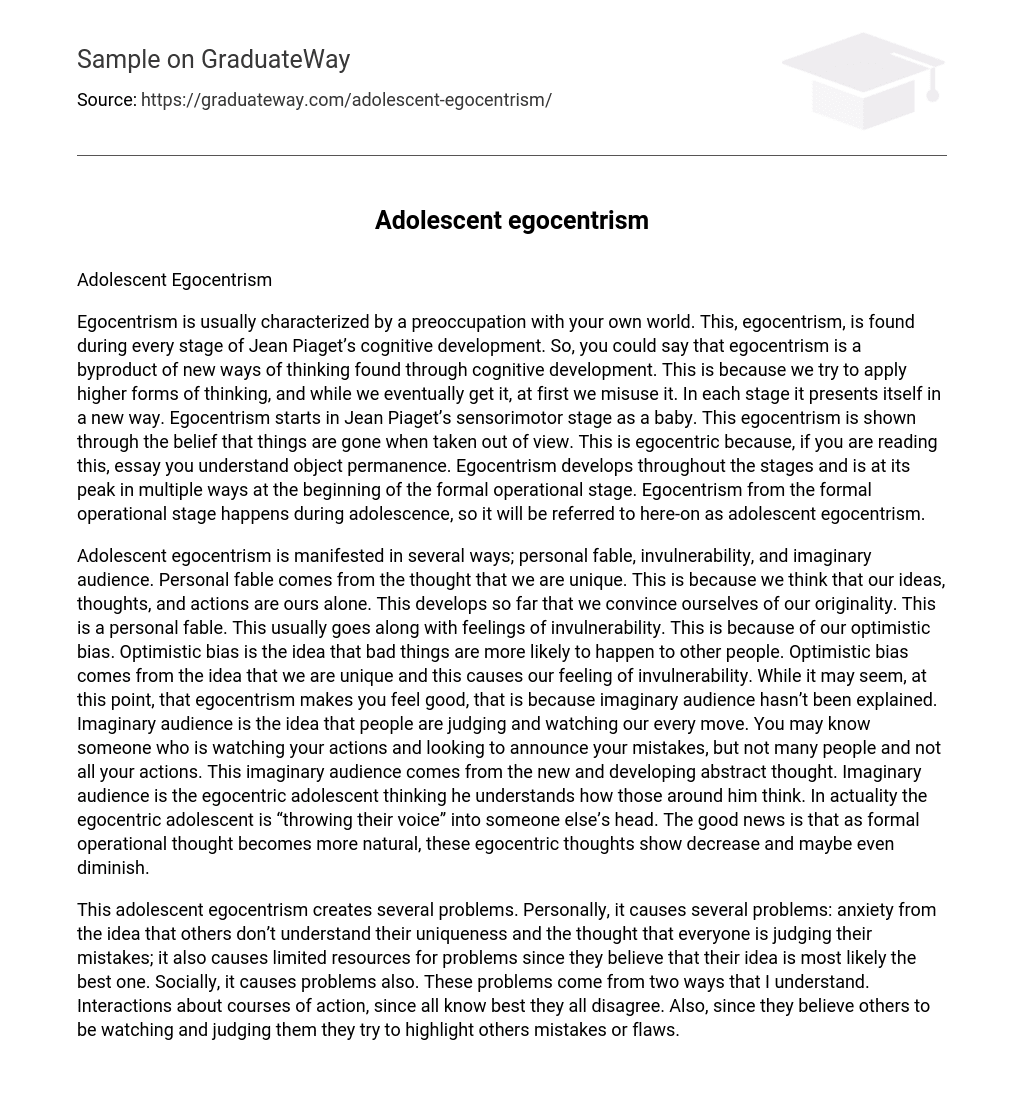Egocentrism is usually characterized by a preoccupation with your own world. This, egocentrism, is found during every stage of Jean Piaget’s cognitive development. So, you could say that egocentrism is a byproduct of new ways of thinking found through cognitive development. This is because we try to apply higher forms of thinking, and while we eventually get it, at first we misuse it. In each stage it presents itself in a new way. Egocentrism starts in Jean Piaget’s sensorimotor stage as a baby. This egocentrism is shown through the belief that things are gone when taken out of view. This is egocentric because, if you are reading this, essay you understand object permanence. Egocentrism develops throughout the stages and is at its peak in multiple ways at the beginning of the formal operational stage. Egocentrism from the formal operational stage happens during adolescence, so it will be referred to here-on as adolescent egocentrism.
Adolescent egocentrism is manifested in several ways; personal fable, invulnerability, and imaginary audience. Personal fable comes from the thought that we are unique. This is because we think that our ideas, thoughts, and actions are ours alone. This develops so far that we convince ourselves of our originality. This is a personal fable. This usually goes along with feelings of invulnerability. This is because of our optimistic bias. Optimistic bias is the idea that bad things are more likely to happen to other people. Optimistic bias comes from the idea that we are unique and this causes our feeling of invulnerability. While it may seem, at this point, that egocentrism makes you feel good, that is because imaginary audience hasn’t been explained. Imaginary audience is the idea that people are judging and watching our every move. You may know someone who is watching your actions and looking to announce your mistakes, but not many people and not all your actions. This imaginary audience comes from the new and developing abstract thought. Imaginary audience is the egocentric adolescent thinking he understands how those around him think. In actuality the egocentric adolescent is “throwing their voice” into someone else’s head. The good news is that as formal operational thought becomes more natural, these egocentric thoughts show decrease and maybe even diminish.
This adolescent egocentrism creates several problems. Personally, it causes several problems: anxiety from the idea that others don’t understand their uniqueness and the thought that everyone is judging their mistakes; it also causes limited resources for problems since they believe that their idea is most likely the best one. Socially, it causes problems also. These problems come from two ways that I understand. Interactions about courses of action, since all know best they all disagree. Also, since they believe others to be watching and judging them they try to highlight others mistakes or flaws. Environmentally, this causes problems at home and school. At home, they feel that their parents don’t understand how life works now and that their parent’s opinions and advice therefore don’t count. At school, all feel misunderstood and some feel that the way to bring you up is through putting others down. This causes a chaos, bullying, and the feeling of having nowhere to belong.
There are many ways to work on fixing this problem in schools. One way is by having teachers that are trained in bystander intervention watch hallways and classrooms in between classes. Another way is to work through abstract thought once they are in the formal operational stage to cause development of their abstract thought. Lastly it is important they understand what they are going through so that they can develop ways to understand themselves. This can be done through counseling for all and freshman psychology courses. Knowledge is power.





